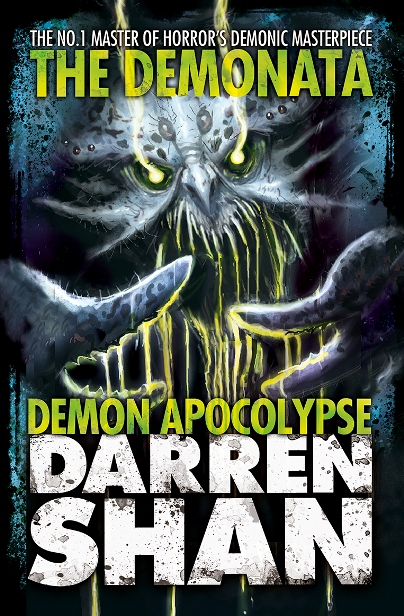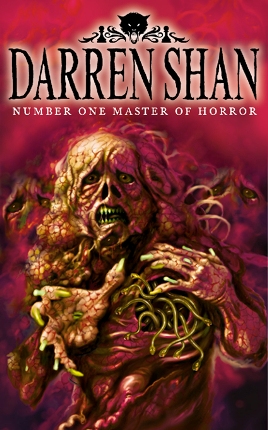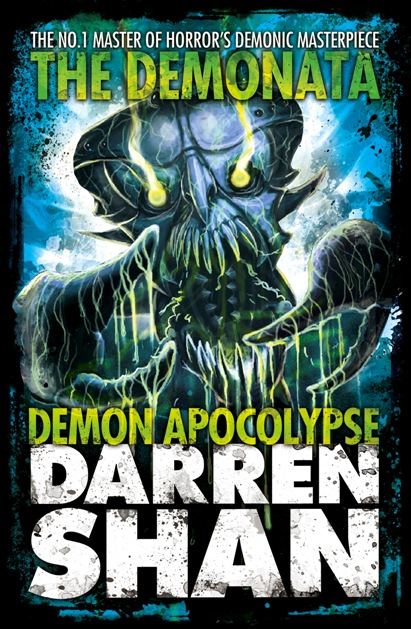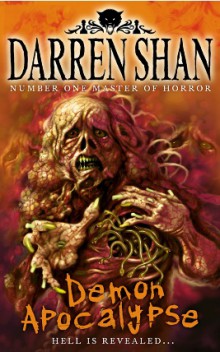Plot Outline:
Demon Apocalypse is set directly after the events of Book 5. Grubbs Grady is trapped on a plane with demons and seems doomed to die. Salvation comes from an unexpected quarter, but soon Grubbs wonders if he might have been better off perishing on the plane!Grubbs becomes a reluctant assistant to an ancient magician and sets out on a life fighting demons. He finds himself unsuited to the job, but when the lives of those he loves most are put at risk, he must try to face his fears and come to terms with his magical powers.
But the world is poised on the brink of an apocalypse. All seems doomed. The Demonata are on the verge of winning the centuries-old war with mankind. If Grubbs is to save his loved ones, he'll also have to save the world. And that's a big ask for a teenager who hates magic and is still worried that he might turn into a werewolf!!!
Author Notes:
Demon Apocalypse, the 6th book of The Demonata, was released on October 1st 2007 -- although we made the book available a few days earlier, at the Bath Book Festival on September 29th, which was when we first revealed the title and cover. I'm not sure you'd be able to keep such a surprise now, as technology has developed so swiftly, but back then it was still possible, and we had great fun keeping everyone in the dark until the day of release! It sold sweetly too, getting to #5 on the overall Amazon UK bestsellers chart!Demon Apocalypse was the fourth Demonata book that I wrote, after Lord Loss, Bec and Blood Beast. I wrote the first draft in March 2004 (over 3 years before it was published). I originally intended Blood Beast and Demon Apocalypse to be one book, and plotted them that way, but I quickly realised that would be a very big book, and since the story had a natural cliffhanger halfway through, I decided to split it in two. The book's working title was DEMONATER (a play on one of my favourite films, The Terminator). I liked the title, as it gave the impression that the main character - Grubbs - was a demon-destroying machine, but ultimately I didn't like it enough to stick with it, and came up with the final title further down the line.
This was the first book in which I wrote about Beranabus and Kernel Fleck. I knew that Beranabus was going to be Bran from Bec -- but only if I decided to publish Bec. At the time I didn't have a series planned out and I wasn't sure if Bec would fit in with the three books I'd written about Grubbs Grady. I thought about maybe releasing the three Grubbs books, one after another, and then perhaps releasing Bec as a standalone prequel later. I was also considering the possibility of creating another standlone prequel, about Beranabus, and I did think about weaving the two of those books in with the Grubbs books, but I wasn't convinced I could make it work.
I didn't know much about Kernel at this stage. Although he was powerful, he didn't have the special power that I would come to give him later, of being able to see panels of light and form them into windows. At this time he was just another Disciple, like any other. I actually planned to kill him off when I was writing my notes (!!!) but later, when I was writing the book, I decided to keep him alive, although I wasn't entirely sure why...
I wrote the following scene in which Kernel tells Grubbs a bit about his early life:
“I was eleven when Beranabus found me. I’d been driven out of my home and village. I’d always been different, able to work magic since I was a very young child. But in recent months it had gotten out of hand. I’d frightened people. Accidentally set fire to the roof of my home. Destroyed a cow.”
“What?” I blink.
“I was trying to make it float,” he says sheepishly. “It was a dare. I lost control. The cow exploded.”
I burst out laughing. “Sorry,” I gasp. “I can’t help it.”
“I know,” he says, smiling humourlessly. “Sounds like fun, making a cow blow up. But I came from a poor, agricultural village. Cows were valuable. A cow meant wealth, food, milk, security, life. Killing one was no small thing. It wasn’t the final straw – that came when the crop failed, which actually had nothing to do with me – but it was one of the last. They thought I was evil. I guess I thought it too. They drove me out. I was subexisting on the fringes of the village, always near starving, no friends, no family. Then Beranabus came along.”
Kernel looks over at the magician again, but with fondness this time. “He saved me. Took me away. Told me the truth about myself. Taught me how to master my powers and use them for good. The downside to that was — I had to fight demons. There was no either/or. He put it to me plain. He’d turn my life around, lift me out of the gutters in which I’d been living, but in return I’d have to do as he said and help him slay the Demonata.”
“But he can’t force you, surely,” I protest.
“No,” Kernel sighs. “But he doesn’t have to. He’s the only family I have. The only true friend. He took me into the other universe within days of bringing me here. That’s how he works with students now — he throws them straight in at at the deep end. It was different when he had a whole class. He worked in this world then, teaching them, bringing them along gradually. Not any more. Now, if he reckons somebody has the power, he tosses them at the demons, stands back and leaves them to it. If they survive, he has a student and partner. If they fail…” Kernel shrugs. “Beranabus has to be ruthless when the occasion calls for it. He doesn’t like it, but that’s life. If you want to fight monsters, you have to be monstrous sometimes.”
I changed virtually all of that when I came to write Demon Thief, and went back in later drafts and re-wrote the Kernel scenes in this book, but that's how he started life. That often happens in books -- you need a starting point in your mind for a character, but they'll later develop in a completely different way than you first imagined. I never worry too much about my characters when I'm plotting a book -- I always trust that they'll lead me in directions of their own, and so far (thankfully!) they have.
The Kah-Gash is another example of how a book can change in subsequent drafts. There was no mention of an ancient demon weapon in the first draft. Grubbs and Bec simply tapped into the power of the Demonata and used that to work their magical spells. At the time I knew that wasn't satisfactory, that there had to be a better explanation for how they achieved what they did (and how Bec cheated death), but since I couldn't think of anything better, I just went along with what I had to hand. The important thing with a first draft is to finish it. Sometimes you have to gloss over problems and errors. I never worry about that -- I know I can return to the story several times and fix the weaknesses then. With a first draft i just want to get the whole thing down on paper, so that I have a rough idea of what it will look like when fully assembled. I address loop holes and logical mires in later drafts. I think it's a good way of working -- by forcing yourself to write, you force yourself to confront and deal with these problems. Otherwise I might still be sitting in my office, all these years later, still playing around with the story ideas inside my head! You can never work everything out in advance -- sometimes you have to make a leap of faith and trust yourself to come up with answers later.
I also didn't know what the shadowy creature glimpsed in the cave was. I didn't think it was that important at the time -- Beranabus did mention it at the end of the book and said he was going to try and track it down, but I didn't know if I'd ever write a sequel to Demon Apocalypse, so it wasn't a big issue.
This was the key book to what became the structure of the final series. First, it made me want to go back and do another Grubbs book, set between Lord Loss and Blood Beast. Because Grubbs wasn't especially powerful in the first book, and because he became SO powerful in this one, I felt there needed to be an in-between book, charting his rise, to make it seem more gradual and realistic. As I was wondering how I could do that, I recalled the idea I'd had to write a book based around a movie set, and the germs for Slawter were born. While I was planning that, and after I wrote it, I kept coming back to the problem of the time-travel and how Grubbs and Bec came by their powers. I realised I needed another book - and another main character - to set up the situation and draw together the various plot threads of the Grubbs Grady books and Bec -- Bec's story didn't fit in with the other books as it stood; something was missing, and eventually I figured out that "something" was Demon Thief, which led me to go back and re-think the character of Kernel Fleck. I decided that he would become the third main character (having toyed with the idea of introducing someone as yet unmentioned in any of the books), and since he lost his eyes in Demon Apocalypse, I figured his special gift should have something to do with his sense of sight, as that would make it more of an issue when his eyes were poked out ...
I had to re-write quite a lot of this book, as the characters of Kernel and Juni evolved. In the first draft Juni met Dervish for the first time, so I had to develop their romance very swiftly -- when I saw an opportunity to include her in Demon Town (which became Slawter), that allowed me to give their relationship more time and space.
Knotting things together is one of the hardest parts of being a writer. Linking a character or event in a scene in one book with a scene in another can be VERY tricky. It's at the heart of what makes a good series, so it's vital to do it well, but you can't always know what's coming in later books, so if you write the series one book at a time, you're limited in certain ways. By juggling several books around over a 2 or 3 year period, I give myself the opportunity to include more "knots". It's a chaotic way to write, and scary because there are times when you're not in control of what you're working on -- but, hell, it's FUN! And when it works, it allows you to create something much more multi-layered and interconnected than you originally imagined.
Some readers have noted that Demon Apocalypse reads like the last book a series. It was certainly written that way -- while I thought it might be possible to write a sequel or two, I didn't plan to do any more books about demons after this one (except for the prequel or two), so I threw in everything I could, kitchen sink and all! I wanted to write a breakneck, thrilling, rollercoaster ride of a book, one that would let me go out in high style. When, much later, I realised I wanted to continue the story on past this point, I faced a HUGE challenge -- how to top a book that, by its very title, seemed almost untoppable?!? The answer lay in that shadowy beast I included as a whim, and although it took me a long time to figure it out, when I did, I saw that there was a LOT more I need to say, and even stranger places I had to go.
Most book series would end on an apocalypse, but in The Demonata the apocalypse isn't the end. In fact, in many ways, it's only the real beginning of the MAIN storyline...
Global Cover Variations
 UK - Demon Apocalypse 2013 1st draft
UK - Demon Apocalypse 2013 1st draft Demon Apocalypse (Netherlands)
Demon Apocalypse (Netherlands) Demon Apocalypse (Ireland and UK Draft)
Demon Apocalypse (Ireland and UK Draft) UK - Demon Apocalypse 2013 2nd draft
UK - Demon Apocalypse 2013 2nd draft Demon Apocalypse PB )Japan)
Demon Apocalypse PB )Japan)